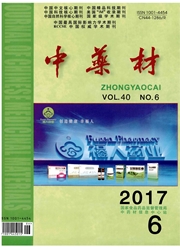

 中文摘要:
中文摘要:
目的:观察溃结灵对溃疡性结肠炎(UC)大鼠模型结肠粘膜Toll样受体(TLR)2、4基因表达的作用。方法:用三硝基苯磺酸(TNBS)法制备UC大鼠模型,将48只大鼠分为正常组、模型组、溃结灵低、中、高三个剂量组和柳氮磺胺吡啶(SASP)组,分别检测肠粘膜TLR2、TLR4基因表达水平。结果:模型组TLR2、11LR4基因相对表达量均明显高于正常组(P〈0.01);溃结灵中、高剂量组TLR2相对表达量明显低于模型组(P〈0.05);溃结灵高剂量组TLR4相对表达量明显低于模型组(P〈0.05)。结论:UC大鼠结肠粘膜TLR2、TLR4基因高表达,溃结灵对TLR2、TLR4基因表达有抑制作用,这可能是其抗UC作用的机理之一。
 英文摘要:
英文摘要:
Objective: To investigate the effect of Kuijieling Decoction(KD) on gene expression of Toll-like receptor(TLR) 2,4 in colonic mucosa of ulcerative colitis(UC) rats. Methods: 48 rats were divided into six groups as follows: normal control(NC) group, model control(MC) group, Kuijieling low dose(KLD) group, Kuijieling medium dose(KMD) group, Kuijieling high dose(KHD) group and SASP group. TLR2/4 gene expression in colonic mucosa was measured by reverse-transcription polymerase chain reaction (RT-PCR). Results: Relative gene expression of TLR2/4 in MC group were significantly higher than that in NC group (P 〈 0. 01 ). Relative gene expression of TLR2 in KMD and KHD group was significantly lower than that in MC group( P 〈 0. 05 ). Relative gene expression of TLR4 in KHD group was significantly lower than that in MC group( P 〈 0. 05 ). Conclusion: Up-regulation of TLR2 and TLR4 gene expression can be seen in colonic mucosa of UC rats. KD can inhibit the gene expression of TLR2 and TLR4. The inhibitory effects of KD on UC may be associated with the inhibition of TLR2 and TLR4 gene expression.
 同期刊论文项目
同期刊论文项目
 同项目期刊论文
同项目期刊论文
 期刊信息
期刊信息
